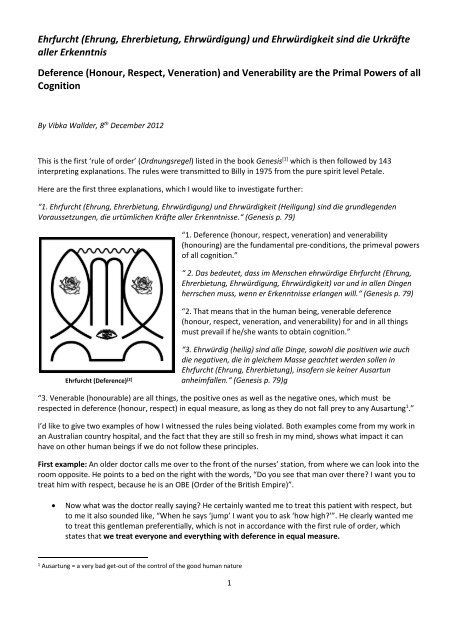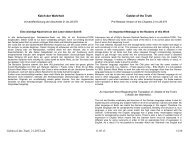View and Download PDF
View and Download PDF
View and Download PDF
You also want an ePaper? Increase the reach of your titles
YUMPU automatically turns print PDFs into web optimized ePapers that Google loves.
Ehrfurcht (Ehrung, Ehrerbietung, Ehrwürdigung) und Ehrwürdigkeit sind die Urkräfte<br />
aller Erkenntnis<br />
Deference (Honour, Respect, Veneration) <strong>and</strong> Venerability are the Primal Powers of all<br />
Cognition<br />
By Vibka Wallder, 8 th December 2012<br />
This is the first rule of order (Ordnungsregel) listed in the book Genesis [1] which is then followed by 143<br />
interpreting explanations. The rules were transmitted to Billy in 1975 from the pure spirit level Petale.<br />
Here are the first three explanations, which I would like to investigate further:<br />
1. Ehrfurcht (Ehrung, Ehrerbietung, Ehrwürdigung) und Ehrwürdigkeit (Heiligung) sind die grundlegenden<br />
Voraussetzungen, die urtümlichen Kräfte aller Erkenntnisse. (Genesis p. 79)<br />
1. Deference (honour, respect, veneration) <strong>and</strong> venerability<br />
(honouring) are the fundamental pre-conditions, the primeval powers<br />
of all cognition.<br />
2. Das bedeutet, dass im Menschen ehrwürdige Ehrfurcht (Ehrung,<br />
Ehrerbietung, Ehrwürdigung, Ehrwürdigkeit) vor und in allen Dingen<br />
herrschen muss, wenn er Erkenntnisse erlangen will. (Genesis p. 79)<br />
2. That means that in the human being, venerable deference<br />
(honour, respect, veneration, <strong>and</strong> venerability) for <strong>and</strong> in all things<br />
must prevail if he/she wants to obtain cognition.<br />
3. Ehrwürdig (heilig) sind alle Dinge, sowohl die positiven wie auch<br />
die negativen, die in gleichem Masse geachtet werden sollen in<br />
Ehrfurcht (Ehrung, Ehrerbietung), insofern sie keiner Ausartun<br />
Ehrfurcht (Deference) [2] aheifalle. (Genesis p. 79)g<br />
3. Venerable (honourable) are all things, the positive ones as well as the negative ones, which must be<br />
respected in deference (honour, respect) in equal measure, as long as they do not fall prey to any Ausartung 1 .<br />
Id like to gie two examples of how I witnessed the rules being violated. Both examples come from my work in<br />
an Australian country hospital, <strong>and</strong> the fact that they are still so fresh in my mind, shows what impact it can<br />
have on other human beings if we do not follow these principles.<br />
First example: An older dotor alls e oer to the frot of the urses statio, fro here e a look ito the<br />
roo opposite. He poits to a ed o the right ith the ords, Do ou see that a oer there? I at you to<br />
treat him with respect, because he is an OBE (Order of the British Empire).<br />
<br />
Now what was the doctor really saying? He certainly wanted me to treat this patient with respect, but<br />
to me it also sounded like, Whe he sas jup I at ou to ask ho high?. He learl ated e<br />
to treat this gentleman preferentially, which is not in accordance with the first rule of order, which<br />
states that we treat everyone <strong>and</strong> everything with deference in equal measure.<br />
1<br />
Ausartung = a very bad get-out of the control of the good human nature<br />
1
The irony with this doctor is that he would always refer to e as the Hu or Wog, util - after ignoring<br />
it for a while - I stood up to him <strong>and</strong> told him that I did not like to be treated like that. From then on he<br />
treated me like every other nurse.<br />
I respoded to the dotor puttig hads o hips ad saig, I treat all patiets ith respet,<br />
thak ou er uh, tured o heels ad et ak to ork.<br />
The second example: One day during h<strong>and</strong>over the nurses were talking about a young female indigenous<br />
person. She was about 16 years old <strong>and</strong> had her tonsils removed two days earlier. The nurse h<strong>and</strong>ing over<br />
finished her report with a snide tone of voice, …ad she hast had a shoer et! As it happened, I was<br />
assigned to the room, so I went into the room, greeted my patients, checked all their charts in order to prioritise<br />
my workload, <strong>and</strong> then I asked the young girl, who was still on intravenous fluids, Would ou like e to assist<br />
you with a shower? With big round eyes <strong>and</strong> a surprised look on her face she asked, Ca I have a shower? So<br />
it appeared to me that this poor girl did not know that she could have a shower whilst on a drip, <strong>and</strong> it seemed<br />
that my colleagues had not bothered offering her the appropriate assistance. Could it be that they had some<br />
prejudice towards indigenous people <strong>and</strong> that they had neglected her <strong>and</strong> failed in their duty of care?<br />
So lets go back to the first two explanations:<br />
Deference (honour, respect, veneration) <strong>and</strong> venerability (honouring) are the fundamental pre-conditions, the<br />
primeval powers of all cognition, <strong>and</strong> that means that it must prevail in us if we want to obtain cognition.<br />
So how do we develop …deference for ad i all thigs <strong>and</strong> make it prevail?<br />
<br />
<br />
<br />
<br />
<br />
By treating all human beings with the same respect, regardless of their social status, achievements in<br />
life, skin colour, age, <strong>and</strong> so forth. In other words, we do not grovel, but we do not neglect them either,<br />
rather we give each one of them the same attention, respect, assistance <strong>and</strong> so forth that we would<br />
expect for ourselves.<br />
By caring for <strong>and</strong> respecting every living creature on this planet <strong>and</strong> not harming them unnecessarily. So<br />
when we kill animals for our consumption, we do it in the most humane manner; but ultimately we<br />
strive for growing the meat in factories. And when we need to kill vermin to protect our health or food,<br />
we should also do it with minimal suffering for the creature.<br />
By protecting the environment: If we treat our environment carelessly by wasting precious resources,<br />
then we do not show the appropriate venerable deference to a planet, which was created over a period<br />
of millions of years for the benefit of evolution. And we do not show respect to the next generations,<br />
who may struggle to live with dignity, because of the wastefulness of preceding generations. We need<br />
to learn to appreciate nature as much as man-made things, <strong>and</strong> we must do everything in our power to<br />
protect it all ad tr ot to otriute to this thro-aa soiet.<br />
By being punctual for meetings <strong>and</strong> appointments. If we are not punctual, we are not showing<br />
deference/respect towards the other person/s, who has/have been made to wait.<br />
By expressing our deference/respect for human beings in our speech.<br />
In contact report 169 [3] Billy <strong>and</strong> Quetzal discuss that talking is supposed to be a means for<br />
communication <strong>and</strong> should really only be used for that purpose, <strong>and</strong> that all communication should be<br />
of a harmonious nature. In this context Billy <strong>and</strong> Quetzal refer to sl<strong>and</strong>er <strong>and</strong> back biting in particular,<br />
which many human beings engage in, <strong>and</strong> which hinders them in their own evolution, because of the<br />
negative effects on their consciousness. But using strong language like swear words or calling other<br />
persons names could not be considered harmonious either, because they always hurt someone, <strong>and</strong> I<br />
think that using them shows a lack of deference, honour, respect <strong>and</strong> veneration. Just think about how<br />
easily <strong>and</strong> readily people use the f-word these days. It has become very common, <strong>and</strong> many of my<br />
fellow human beings seem to think that it is cool to use it, <strong>and</strong> that I am old-fashioed eause I dot.<br />
But to me using the f-word or other strong language is a sign of the decline of our society, how our<br />
2
communication <strong>and</strong> respect for each other is diminishing, <strong>and</strong> how little control we have over our<br />
emotions when we use swear words like that.<br />
Freedom <strong>and</strong> peace on this planet can only be obtained with deference, honour, respect <strong>and</strong> veneration. Many<br />
of us may think that we are already doing our bit towards freedom <strong>and</strong> peace on this planet <strong>and</strong> that we are not<br />
the ones causing all the trouble, because we are not fighting with our neighbours <strong>and</strong> we are peace loving in<br />
general. Its usually the others that are upsetting the apple cart. However, if every night we honestly reflect back<br />
on our day <strong>and</strong> think about our thoughts, words <strong>and</strong> actions, we will probably find that we have strayed off the<br />
path somewhere along the line <strong>and</strong> that there is room for improvement, because every thought of envy,<br />
jealousy, dislike, hatred <strong>and</strong> so forth can subconsciously lead to a negative word or action, which in turn then<br />
breaches this first rule of order.<br />
Contributing to freedom <strong>and</strong> peace means that we consider <strong>and</strong> respect others right to decide, their wishes,<br />
their needs <strong>and</strong> personalities <strong>and</strong> that we do not try to curtail their way of life; that we do not try to push our<br />
opinion on them in the slightest manner. It means that we accept others as they are, with their peculiarities,<br />
ideas, wishes, needs <strong>and</strong> so forth, <strong>and</strong> that we do not try to change them, or judge them in any way.<br />
The only person one can change for the better is oneself, <strong>and</strong> if we develop more deference, honour, respect<br />
<strong>and</strong> veneration within us we will gain cognition <strong>and</strong> contribute to peace in this world.<br />
Nur durh das Ershaffe o Erketisse erag sih der Mesh<br />
Wisse ud Weisheit soie ahre Liee aufzuaue. [4]<br />
Only through the creation of cognition is the human being able to<br />
uild up koledge ad isdo as ell as true loe, hih are<br />
fundamental to our evolution.<br />
The abilities <strong>and</strong> powers for it rest idle in our consciousness <strong>and</strong> we<br />
can experience everything <strong>and</strong> obtain cognition, knowledge, wisdom<br />
<strong>and</strong> love if we develop certain powers within us through studying the<br />
spiritual teaching, thinking about it, working through it, applying it to<br />
our daily life <strong>and</strong> thus developing the powers of underst<strong>and</strong>ing <strong>and</strong><br />
ability.<br />
Erkenntnis (cognition)<br />
Petale further states in the iterpretig eplaatios that the door to cognition opens according to a distinct<br />
rule of order (Ordnungs-Regel); <strong>and</strong> below I have summarised a few points from the explanations:<br />
<br />
<br />
<br />
<br />
It begins with developing a favourable fundamental mood of our consciousness <strong>and</strong> psyche, <strong>and</strong> the<br />
basic factor for it is deference <strong>and</strong> control. Deference here is not meant in the sense of putting someone<br />
or something on a pedestal <strong>and</strong> which leads to submissiveness, but rather seeing others as equals with<br />
equal values.<br />
By the same token, criticism must only be applied in equalisedness so that it does not turn into judging<br />
others <strong>and</strong> thus to a damaging factor.<br />
Therefore we need to continuously work hard <strong>and</strong> energetically on ourselves, study the spiritual<br />
teaching <strong>and</strong> experience it through our own thinking <strong>and</strong> action.<br />
We may seek a teacher, who can explain the teaching to us, but the real work happens within ourselves.<br />
Through self-education we must tune ourselves into deference <strong>and</strong> so forth <strong>and</strong> must search for it in our<br />
environment, in other human beings, in animals <strong>and</strong> plants <strong>and</strong> approach each <strong>and</strong> everyone in<br />
equalisedness.<br />
3
We must not see only the good or only the bad, but rather see both equally for what they are, namely<br />
factors of life that are necessary for evolution.<br />
Therefore, we must never be judgemental, rather be discerning <strong>and</strong> respecting <strong>and</strong> make this our<br />
internal <strong>and</strong> external rule of life.<br />
This rule of order must be a part of our consciousness, as well as our thoughts <strong>and</strong> feeling <strong>and</strong> our<br />
psyche <strong>and</strong> we should endeavour to keep it in our fine-spiritual perception, feelings <strong>and</strong> thoughts,<br />
whether we are awake or asleep, whether we are alone or in company.<br />
This is our starting point if we want to enter the mysteries of the spiritual teaching <strong>and</strong> gain higher<br />
knowledge <strong>and</strong> useful cognitive skills <strong>and</strong> powers.<br />
We must constantly endeavour to find <strong>and</strong> create deference (honour, respect, veneration) <strong>and</strong><br />
venerability (honouring), so that they become a constant feature in our consciousness <strong>and</strong> replace<br />
thoughts <strong>and</strong> feelings of non-deference, disrespect, <strong>and</strong> so on, as well as snide criticism <strong>and</strong> erroneous<br />
appraising of others.<br />
Completely silent <strong>and</strong> unnoticeable to the outside world, a change will occur within us when we walk<br />
the path of cognition <strong>and</strong> develop deference. Ol the koig oes, ho speak the laguage of the<br />
spiritual teaching, will notice the change in us.<br />
We will continue with our work <strong>and</strong> obligations as usual, because the change happens internally,<br />
invisible <strong>and</strong> unrecognisable to the uninitiated ones.<br />
But in us the sprouting deference (honour, respect, veneration) <strong>and</strong> venerability (honouring) illuminates<br />
the life of the consciousness <strong>and</strong> the psyche.<br />
And in the sprouting general mood, our entire consciousness-life <strong>and</strong> psyche-life suddenly finds a<br />
beaming <strong>and</strong> warming epicentre, which rises like the sun, which by means of its rays, frees everything<br />
that lies dormant in the darkness <strong>and</strong> awakens it to life by means of its warmth.<br />
It ot e easy in the beginning to realise that deference (honour, respect, veneration) <strong>and</strong> venerability<br />
(honouring) are the basic factors of all cognition, because we are still caught up in some belief, <strong>and</strong><br />
through our belief assume that cognition is merely a skill in itself <strong>and</strong> a pure thought process.<br />
But its not; ogitio is ahieed through deferee, hoour, respet…<br />
However, all cognition has its origin in our consciousness <strong>and</strong> thoughts as well as our feelings.<br />
Therefore we need to learn to control our feelings, thoughts <strong>and</strong> fine-spiritual perception <strong>and</strong> steer<br />
them with the appropriate strength according to need.<br />
We must also learn to create them consciously <strong>and</strong> to work with them.<br />
References:<br />
1. Meier, BEA 1975/2011, GENESIS (Schöpfungs-Genesis), 2. Auflage, Wassermannzeit-Verlag, CH-8495 Schmidrüti,<br />
Schweiz [available in German only] (page 79).<br />
2. Meier, BEA 2004, Symbole der Geisteslehre, Wassermannzeit-Verlag, CH-8495 Schmidrüti, Schweiz [available in<br />
German only].<br />
3. Meier, BEA 2004, Plejadisch-plejarische Kontaktberichte Block 4, Wassermannzeit-Verlag, CH-8495 Schmidrüti,<br />
Schweiz [available in German only] (page 415)<br />
4. Meier, BEA 2012, Lehrschrift für die Lehre der Wahrheit, Lehre des Geistes, Lehre des Lebens, Wassermannzeit-<br />
Verlag, CH-8495 Schmidrüti, Schweiz [available in German only] (page 11)<br />
4




